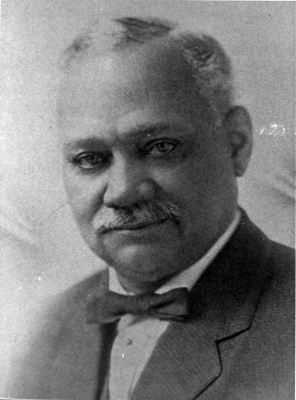Congressman Vic Snyder championed civil rights by writing legislation to honor local activists and have their efforts remembered for posterity. In 2007, Snyder successfully passed legislation that designated a federal post office the “Scipio A. Jones Post Office” in honor of Scipio Jones, a prominent Black attorney from Little Rock.
LITTLE ROCK ATTORNEY
Scipio A. Jones
Scipio Africanus Jones was born into slavery in 1863 near Tulip in Dallas County, Arkansas. He later moved to Little Rock and attended Walden Seminary (now Philander Smith College). In 1885, Jones earned his bachelor’s degree from Shorter College and then worked as an apprentice for Judge Robert Lea Jones. After passing the Arkansas bar in 1889, Jones was admitted to practice in state and federal courts, including the Supreme Court of Arkansas in 1900 and the U.S. Supreme Court in 1905. Over the course of Reconstruction and the early 1900s, he became a well-respected lawyer, Republican politician, and Black community leader.
ELAINE RACE
Massacre

Jones is best known for his defense of the “Elaine Twelve,” twelve Black men who were wrongly convicted and sentenced to death in the Elaine Race Massacre in 1919. On the night of September 30, 1919, Black sharecroppers met a few miles outside of Elaine at the Hoops Spur church for a Progressive Farmers and Household Union of America (PFHUA) meeting. A group of Phillips County law enforcement officers interrupted the meeting, and gun violence broke out. One officer was killed, and another was wounded. The following day hundreds of armed white men from outside the area poured into the county to kill, torture, and imprison Blacks, claiming the sharecroppers had incited an insurrection. After investigating the events at Elaine, NAACP representative Walter White wrote that there was no factual evidence of an insurrection.
In November 1919, the NAACP hired Scipio Jones and George C. Murphy to defend the twelve men who were condemned to death for their roles in the alleged insurrection. Jones successfully appealed the case to the U.S. Supreme Court. In the landmark court decision Moore v. Dempsey, the Supreme Court ruled that the defendants’ mob-dominated trials had deprived them of their constitutional right of due process, so the criminal charges were overturned. As a result of Jones’s efforts, the twelve men gained their freedom.
POST OFFICE
Dedication
While many might know this information about Scipio Jones, few know the backstory of how a federal post office located on Main Street in Little Rock became the Scipio A. Jones Post Office. One afternoon in his Washington DC office, Congressman Vic Snyder and his legislative staff member James Savage had a conversation about the Haven of Rest Cemetery, located on 12th Street in Little Rock. Savage had noticed some issues regarding the cemetery and brought them to the congressman’s attention. During their discussions and research about the cemetery, Snyder and Savage learned about the notable Black people buried there, including Scipio A. Jones. Following these conversations with Savage, Snyder read Grif Stockley’s book, Blood in Their Eyes, which gave a historical account of the Elaine Race Massacre. After reading the book and conducting additional research about Jones, Congressman Snyder drafted legislation to honor Jones’s civil rights legacy.
On March 7, 2007, the 110th Congress passed H.R. 433 to designate the facility of the United States Postal Service located at 1700 Main Street in Little Rock as the “Scipio A. Jones Post Office Building.” The dedication program was attended by Jones's granddaughter Hazel Adams, graduates of Scipio A. Jones High School, and community and political leaders from Arkansas.
Despite the obstacles and prejudice of being a Black man born into slavery and raised on a plantation, Scipio A. Jones became an accomplished civil rights lawyer whose achievements impacted both Arkansas and American history. By designating the post office in Jones’s name, Congressman Snyder not only commemorated Jones’s great works, but also prompted future generations to learn about civil rights history in Arkansas.
For More Information:
James Savage, former Legislative Staff for U.S. Congressman Vic Snyder, personal communication with author.
Stockley, Grif. “Elaine Massacre of 1919.” Encyclopedia of Arkansas. Central Arkansas Library System. November 18, 2020. https://encyclopediaofarkansas.net/entries/elaine-massacre-of-1919-1102/.
Teske, Steven. “Scipio Africanus Jones (1863-1943).” Encyclopedia of Arkansas. Central Arkansas Library System. May 18, 2021. https://encyclopediaofarkansas.net/entries/scipio-africanus-jones-2427/.
U.S. Congress. House. To designate the facility of the United States Postal Service located at 1700 Main Street in Little Rock, Arkansas, as the "Scipio A. Jones Post Office Building." H.R. 433. 110th Cong. 2007. https://www.congress.gov/bill/110th-congress/house-bill/433/text/pl.
About the Author:
Maria Hoskins has a B.A. degree in Mass Communications and English from Philander Smith College, and she is currently the Community Outreach Specialist for the Department of Justice. Hoskins has served the federal government for over twenty years, including ten years as a Senior District Staff representative for U.S. Congressman Vic Snyder from 2001-2011. In addition to her federal service, Hoskins is an adjunct faculty in the Criminal Justice Department at Philander Smith College, a certified law enforcement instructor, and a published author of six children’s books.

